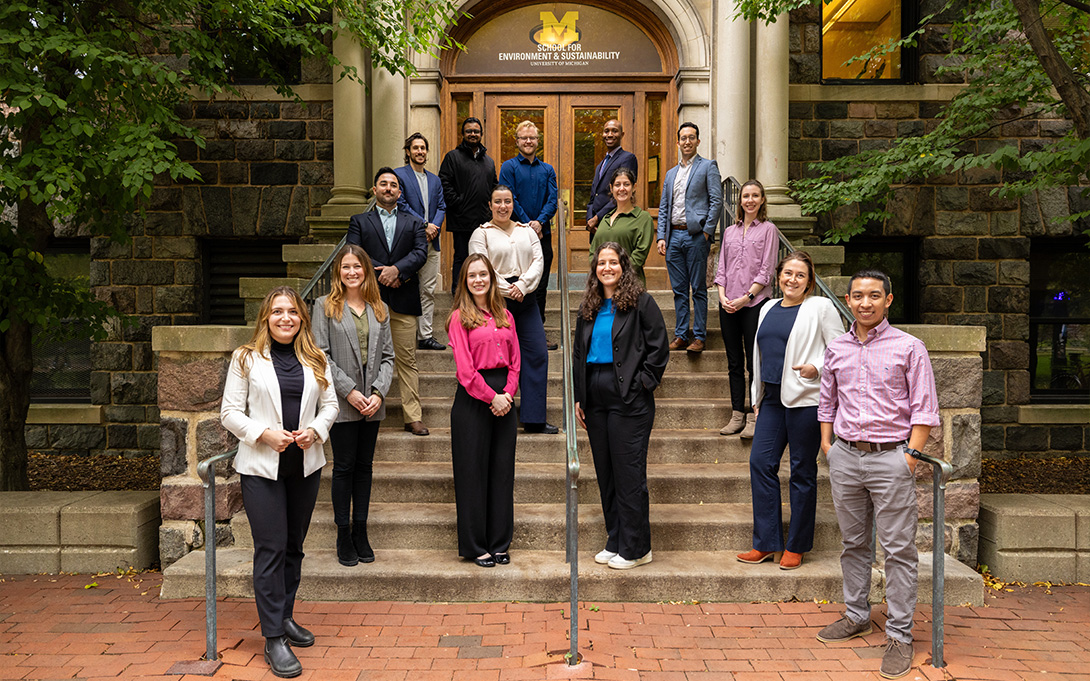
Several Ford School students are among the sixteen University of Michigan students who will attend the two-week COP28 climate summit in Dubai, United Arab Emirates. The students will observe the negotiations, attend side events and interact with various experts.
This year's conference runs from Nov. 30 to Dec. 12. U-M has sent student delegations to U.N. climate change conferences since 2009.
Zoe Salamey is a master's student and a Bohnett Public Service and Leadership Fellow at the Ford School of Public Policy. She serves on the advocacy coordination team of the YOUNGO Climate, Peace, and Security working group and at the city of Detroit's Office of Sustainability, helping to accelerate the use of renewable energy in municipal operations.
Prior to her graduate studies, Salamey worked within the electrical utility sector on smart grid and technology projects related to renewable energy. She also served on the Sustainable Development Goal 7 Youth Constituency, the energy working group of the United Nations-mandated Major Group for Children and Youth.
At COP28, Salamey will observe conversations about climate financing and how developed countries can contribute to global mitigation efforts.
"Given the failure of the international community to reach its climate commitments, urgent action is necessary to ensure that communities are prepared and protected from the coming effects of climate change," she said. "These conversations, involving stakeholders large and small, are important opportunities for collective action and equity that center around using our resources to innovate, to solve global challenges, and to ensure that the most vulnerable communities are included and supported."
Salamey will attend the second week of the two-week conference.
Sarah Dieck Wells is a dual-degree master's student at the Ford School of Public Policy and School for Environment and Sustainability. While pursuing her graduate studies, she has worked with U-M's Graham Sustainability Institute to develop and implement community engagement strategies to promote renewable energy and energy efficiency projects at the state and local government levels, and has supported communities aiming to leverage federal funding opportunities to support local sustainability initiatives.
"I am very excited to represent the University of Michigan as a student delegate at the COP28 climate conference in Dubai, United Arab Emirates, in December," she said. "In addition to conversations related to climate financing and collaborative strategies to improve global resilience to the impacts of climate change, I am looking forward to hearing how countries respond to the findings from the first Global Stocktake process, which evaluates collective progress toward meeting the objectives of the Paris Agreement.
"The updated contributions and climate policies set forth by nations are critically important to accomplishing these global adaptation and mitigation goals, so I will be watching this aspect of the negotiations closely."
Dieck will attend the second week of the two-week conference.
Carmen Wagner is a dual-degree master's student at the Ford School of Public Policy and School for Environment and Sustainability, specializing in environmental justice and environmental policy and planning. Her master's project at SEAS, working with the United Nations Framework Convention on Climate Change, focused on overcoming barriers to disseminating and accessing climate information services in Samoa and Vanuatu. She provided policy recommendations for local governments, NGOs and regional/international development organizations. Wagner is also interested in ensuring a just energy transition, energy efficiency efforts and renewable energy investments internationally.
"Energy systems across the world will need quick, smart and technological transformations toward clean energy to reduce emissions and mitigate climate change. However, we must include frontline communities in decision-making processes and ensure equitable deployment of clean energy," she said. "This work involves policymakers, engineers, local communities, corporations and many more. At COP28, I look forward to learning more about how countries, policymakers and communities work to ensure a just transition.
"Furthermore, I'm curious to see the impacts of the COP27 Loss and Damage Fund, which provides funds to vulnerable nations impacted by climate change. My master's project in Vanuatu and Samoa exposed me to the major need for funding, resources and capacity-building in countries most impacted by climate change. I'm interested in whether this help has been provided and what work has been done with these funds."
Wagner will attend the first week of the two-week conference.
Alexandra Stavros is a master's student at the Ford School of Public Policy, specializing in international policy. She is on the board of Climate Blue, a U-M student organization whose mission empowers the local community to become more engaged in climate action and works directly with the delegation attending COP meetings to bring home lessons learned to share with the Ann Arbor and university communities.
"With the impacts of climate change becoming increasingly urgent, policymakers and leaders must keep up with the pressing demands," she said. "I am especially interested in exploring how solutions and commitments to climate change intersect with pressing security issues across the globe—the national and international risks caused by climate change.
"At COP28, I am excited to gain a deeper understanding of innovative solutions and global collaborations to mitigate and resolve conflict and security dilemmas exacerbated by climate change."
Stavros will attend the second week of the two-week conference.
This was compiled by Jim Erickson of Michigan News and Lori Atherton of SEAS.